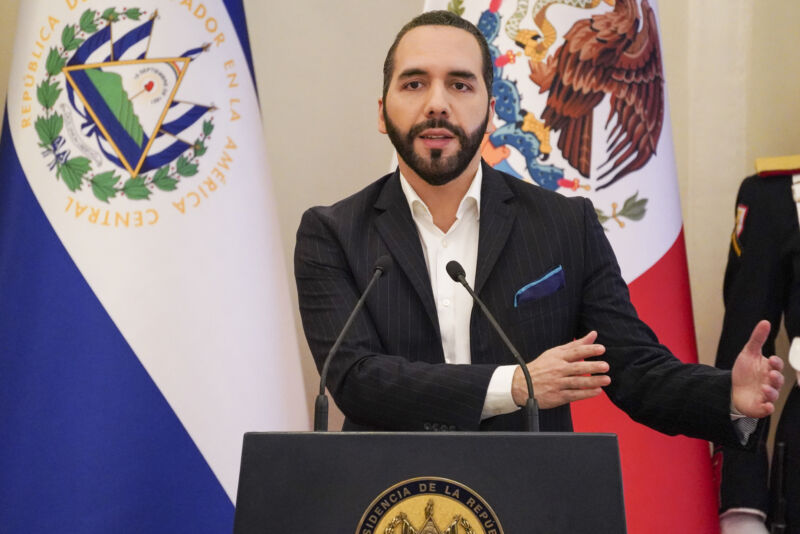
Bitcoin’s price has plunged in recent days, briefly falling below $30,000 on Monday evening and again on Wednesday morning. Nayib Bukele, the bitcoin-boosting president of El Salvador, sees bitcoin’s low price as a buying opportunity. He announced on Monday that El Salvador had purchased another 500 bitcoin. With one bitcoin worth around $31,000, this represented a $15.5 million bet.
Bukele has made the embrace of bitcoin a signature of his presidency. Last year, El Salvador became the first nation in the world to make bitcoin legal tender alongside the US dollar. In an effort to encourage adoption of bitcoin, El Salvador launched wallet software called Chivo and offered Salvadorans $30 if they gave it a try.
Bloomberg calculates that El Salvador has accumulated a total of 2,301 bitcoins since it started buying them last September. Most were bought at prices above $45,000, so this nation of 6 million people has lost tens of millions of dollars speculating on bitcoin.
A precarious financial situation
The government of El Salvador is heavily in debt and has an $800 million debt payment coming due in January. Last week, ratings agency Moody’s downgraded El Salvador’s debt, warning that the Central American nation may be forced to default. El Pais reports that Salvadoran bonds are trading at around 40 percent of their face value, a sign that traders see this as a serious risk.
El Salvador’s bitcoin experiment has worsened the country’s already precarious financial situation. That’s not only because Bukele has tied up tens of millions of dollars in the volatile cryptocurrency. It has also damaged Bukele’s relationship with the International Monetary Fund, which is currently considering whether to offer El Salvador a $1.3 billion line of credit.
In January, the IMF recommended that El Salvador liquidate its bitcoin holdings in order to shore up its fragile balance sheet. The Bukele administration reacted angrily, with Treasury Minister Alejandro Zelaya declaring that “no international organization is going to make us do anything, anything at all.” Bitcoin’s price has fallen by about 17 percent since the IMF made its recommendation.
Bitcoin City
Bukele is also pushing forward with plans to construct a new “Bitcoin City” in the shadow of El Salvador’s Conchagua volcano. The idea would be to create a global hub for cryptocurrency users and entrepreneurs—all powered by geothermal energy from the volcano. On Monday, Bukele tweeted photos of himself reviewing a scale model of the planned metropolis.
To jumpstart the project, Bukele is planning to sell $1 billion worth of “bitcoin bonds.” In an unusual financial arrangement, half the proceeds would be invested in bitcoin, while the other half would be spent on infrastructure projects for the new city. If bitcoins gain value over the 10-year life of the bond, bond investors would get half the gains.
Critics pointed out that this arrangement makes little sense, since people who want to invest in bitcoin can invest directly in bitcoin and get 100 percent of any gains. But Bukele is counting on the novelty of the bonds—which are slated to be tokenized and sold on a blockchain—to attract investors.
These bonds were initially scheduled to be introduced in March. But that month the government postponed the debt issuance, citing the economic turmoil caused by Russia’s invasion of Ukraine. El Salvador’s finance minister said that the bonds would be introduced in September at the latest.
But if El Salvador doesn’t improve its financial position, it may become increasingly difficult to issue debt of any kind, since investors will be worried about the risk of an impending default.
https://arstechnica.com/?p=1853555

